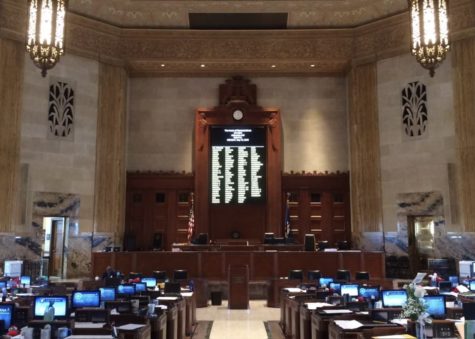Louisiana decides tax reform, prison labor amendments

Much of the focus of last week's midterm elections was on candidates, but Louisiana residents also voted on eight amendments to the state's constitution, ranging in issues from property taxes to language about slavery.
The amendments did not make it to the ballot without controversy as some prompted complaints about confusing and misleading language.
Passed
Voters approved two tax amendments and a water bill measure.
Amendment 2 proposed to expand tax exemptions for certain disabled veterans and for their spouses after their death. That amendment passed with 73% of the vote.
Amendment 4 would allow the government to reduce customer water bills if the usage charges were due to circumstances out of the customer's control, such as failed infrastructure. Seventy-five percent of Louisianans voted “yes,” granting local government entities more control over water bills.
Amendment 8 would remove the required annual income recertification for disabled citizens to receive property tax breaks. In other words, disabled people would no longer need to verify with the government each year that they make under $100k/year in order to receive tax breaks. This amendment passed with 55% of the vote.
Failed
Louisianans voted against five of the eight ballot amendments last week, including a muddled measure to ban slavery whose own sponsor urged voters to vote “no” because of confusion in its wording.
Amendment 1 proposes to increase the maximum amount of trust fund money that the state can invest in stocks from 35% to 65%. That amendment failed to pass, garnering a 64% “no” vote and keeping the cap for trust fund investments in the state at 35%.
Amendment 3 would allow civil service employees, ranging from police officers to mailmen, to publicly endorse political campaigns of immediate family when off-duty. 67% of residents voted “no,” meaning that civil service employees are still barred from participating in political campaigns, regardless of their relation to the candidate.
Amendment 5 would give taxing bodies the flexibility to adjust millages — values used to calculate property tax — at any time. Currently, properties are reappraised every four years and their millages are adjusted accordingly. Proponents of the amendment argue that it would discourage taxing bodies from imposing the maximum millage rates in anticipation of needing increased tax revenue. Some point out that the wording on the ballot may have discouraged voters from supporting the amendment. Critics say that the uncertainty of need-based tax hikes would be a burden for residents and businesses. Fifty-seven percent of people voted against this amendment, so the current system of reappraisals every four years will remain.
Amendment 6, which applies to residents of Orleans Parish but was on the ballot statewide, failed to pass by about 7000 votes — less than 1% of total votes. The amendment would have capped yearly property tax increases in Orleans Parish at 10%. Its aim was to relieve the burden on New Orleans homeowners of rising home values, which have resulted in surging property tax rates. Opponents of Amendment 6 contend that Orleans Parish government agencies are already struggling to function and limiting tax revenue would only exacerbate this issue.
Amendment 7 would formally outlaw involuntary servitude and slavery except in cases of criminal justice. The creator of the original bill, Rep. Edmond Jordan (D-Baton Rouge), urged Louisianans to vote “no” on the amendment, arguing the bill had been revised so severely by the legislature since its introduction that it could now be interpreted in support of unpaid prison labor, even though its original goal was to improve conditions for prisoners. Sixty-one percent of voters rejected the amendment, giving Jordan and his colleagues another year to reword the bill and clarify its intentions.
In addition to the eight amendments on the November ballot, Louisiana voters can vote on three more amendments on Dec. 10. These amendments propose to clarify that Louisiana voters must be U.S. citizens, the Senate must confirm Civil Service Commission Members and the Senate must also confirm State Police Commission Members.
This “Eyes on Trafficking” story is reprinted from its original online location.
 ABOUT PBJ LEARNING
ABOUT PBJ LEARNING
PBJ Learning is a leading provider of online human trafficking training, focusing on awareness and prevention education. Their interactive Human Trafficking Essentials online course is used worldwide to educate professionals and individuals how to recognize human trafficking and how to respond to potential victims. Learn on any web browser (even your mobile phone) at any time.
More stories like this can be found in your PBJ Learning Knowledge Vault.
EYES ON TRAFFICKING
This “Eyes on Trafficking” story is reprinted from its original online location.
ABOUT PBJ LEARNING
PBJ Learning is a leading provider of online human trafficking training, focusing on awareness and prevention education. Their interactive Human Trafficking Essentials online course is used worldwide to educate professionals and individuals how to recognize human trafficking and how to respond to potential victims. Learn on any web browser (even your mobile phone) at any time.
More stories like this can be found in your PBJ Learning Knowledge Vault.
